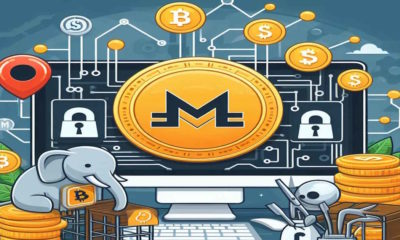Altcoins
Privacy Coins Benefits and Criticisms

Privacy coins, also known as anonymous or stealth coins, are a type of cryptocurrency that offer increased privacy and anonymity for their users. These coins use various technologies such as zero-knowledge proofs and coin mixing to mask the identity of the sender and receiver of transactions.
One of the most well-known privacy coins is Monero (XMR), which uses a technique called ring signatures to mix a user’s transaction with several others, making it difficult to trace the origin of the funds. Another popular privacy coin is Zcash (ZEC), which uses a technology called zk-SNARKs to encrypt the details of a transaction, including the sender and receiver’s address and the amount being transferred.
Privacy coins have become increasingly popular as concerns about online privacy and surveillance have grown. They offer a way for individuals to keep their financial transactions private and secure, which can be particularly valuable for those living in countries with oppressive governments or for people who want to keep their financial activities separate from their personal identity.
Despite this, privacy coins continue to be a niche market in cryptocurrency, with more and more projects being developed with privacy features. Some of these projects include Dash, PIVX, Verge, Grin, Horizen, and Beam.
Features and benefits of privacy coins
Privacy coins offer several features and benefits for their users, including:
Increased privacy and anonymity
The main feature of privacy coins is the increased level of privacy and anonymity they provide. This can be particularly valuable for people living in countries with oppressive governments or for individuals who want to keep their financial activities separate from their personal identity.
Coin mixing features
Many privacy coins offer coin mixing feature, which mixes a user’s transaction with several others. This makes it difficult to trace the origin of the funds and mask the identity of the sender and receiver. For example, Monero uses a technique called ring signatures to mix transactions.
Zero-knowledge proofs
Some privacy coins, such as Zcash, use a technology called zk-SNARKs to encrypt the details of a transaction, including the sender and receiver’s address and the amount being transferred. This provides an additional layer of privacy and security for users.
Decentralization
Privacy coins, like most cryptocurrencies, are decentralized and operate on a blockchain network. This means that transactions are recorded on a public ledger and can be verified by anyone, while the identity of the parties involved is still protected.
Protecting personal information
Privacy coins can help protect personal information from being exposed to potential hackers or cybercriminals.
Financial freedom
Privacy coins allow individuals to make transactions without the need to reveal their identity, giving them more financial freedom.
Protection against government surveillance
Privacy coins can also provide protection against government surveillance and censorship.
Main criticisms of privacy coins
Association with illegal activities
One of the main criticisms of privacy coins is their association with illegal activities such as money laundering, the purchase of illegal goods on the dark web, and the financing of terrorism. The anonymity provided by these coins makes it difficult for authorities to trace the origin of funds and track down criminals.
Taxes evasion
Another criticism is that privacy coins can be used to evade taxes. The anonymity provided by these coins makes it easy for individuals to hide their assets and income from the government, which can result in a loss of tax revenue for governments.
Government crackdown
Some governments have taken a hardline stance against privacy coins, with several countries outright banning their use. For example, Japan has banned the use of Monero, Zcash and Dash, and several exchanges have de-listed these privacy coins, making it difficult for people to buy or sell them.
Association with Deebweb
Privacy coins have also been criticized for their association with Deebweb marketplaces and cybercrime. For example, Monero has been used as a method of payment on the now-defunct darknet marketplaces such as the infamous Alphabay and Dream Market.
Despite these criticisms, privacy coins continue to be popular among a niche group of individuals who value privacy and anonymity. Some projects have been developed to address these issues, such as Tari, which aims to provide privacy and anonymity while also complying with regulatory requirements and preventing illegal activities.
Conclusion
Privacy coins are a form of cryptocurrency that offers increased privacy and anonymity for their users. They use various technologies to mask the identity of the sender and receiver of transactions, providing a way for people to keep their financial activities private. While privacy coins have been criticized for their potential use in illegal activities, they continue to be a niche market in the cryptocurrency space.
Altcoins
P2P NFT Trading Platform Faces Breach: Users Urged to Take Immediate Action

NFT Trader, a peer-to-peer (P2P) trading platform, recently experienced a security breach leading to the unauthorized transfer of significant NFT assets. The attacker, identified as 0x90…8fda, successfully made off with 37 Bored Ape Yacht Club (BAYC), 13 Mutant Ape Yacht Club (MAYC), 4 World of Women, and 6 VeeFriends NFTs, collectively valued at 1,080 ETH (approximately $2.4 million). Users are strongly advised to promptly revoke any authorization granted to the platform.
Initial reports, shared by Chinese crypto news reporter Colin Wu on social media, indicate that the pilfered NFTs were sent to the address 0x909F2159780e64143CF08f32dBBF56Ed19478fda (link to tweet). An on-chain message from the address holder, claiming the role of a “scavenger,” refutes allegations of hacking the P2P trading platform. Instead, they assert rescuing the NFTs with the intention of returning them.
Further information reveals that the alleged real hacker’s address is 0x3dc115307c7b79e9ff0afe4c1a0796c22e366a47b47ed2d82194bcd59bb4bd46.
NFT Trader has acknowledged the security incident and disclosed that the attack targeted old smart contracts. In response, the platform is advising users to remove delegations via Revoke.cash from the following addresses:
- 0xc310e760778ecbca4c65b6c559874757a4c4ece0
- 0x13d8faF4A690f5AE52E2D2C52938d1167057B9af
Despite being relatively unknown among NFT traders, NFT Trader’s website identifies its CEO as John Pak, collaborating with co-founders Mattia Migliore and an individual using the pseudonym “Bruckzr” (link to tweet).
On social media, an NFT collector (@dingalingts) has urged traders to “revoke approval to their contract ASAP” for those who have engaged with NFT Trader previously. The stolen digital assets, which exceed $2 million in value, include 37 BAYC, 13 MAYC, 4 World of Women, and 6 VeeFriends.
Altcoins
Uphold Exchange Announces Evernode Airdrop for XRP Holders

Uphold exchange has revealed its support for the upcoming Evernode Airdrop. The airdrop, exclusively for XRP holders, promises to reward participants with EVRS tokens.
The Evernode Airdrop: What You Need to Know
Scheduled for September 1, 2023, at 6:00 PM AEST (8:00 AM UTC), the Evernode Airdrop snapshot is poised to capture the XRP holdings of participants. This snapshot is a pivotal moment as it forms the basis for determining the proportion of EVRS tokens that qualifying XRP holders will receive. It’s important to note that this snapshot will consider XRP holdings up to a limit of 50,000 XRP tokens, ensuring a level playing field for all participants.
The fairness and equality of the distribution process is a core principle of this airdrop. Uphold is keen on ensuring that participants receive EVRS tokens in a manner that reflects their XRP holdings accurately. This approach not only promotes inclusivity but also reflects Uphold’s dedication to creating value for its user base.
Factors Influencing Airdrop Date and Availability
While the snapshot is scheduled for September 1, the airdrop date itself remains contingent on various external factors. Particularly, the launch of the new Xahau Network holds sway over the timeline. Uphold is steadfast in keeping its users informed about any updates regarding the airdrop’s timeline. Participants should be aware that initial access to EVRS tokens on the Uphold exchange might be limited. Uphold’s stringent listing criteria and liquidity requirements must be met before the tokens become fully tradable.
Qualification and Distribution Process
Participating in the Evernode Airdrop is refreshingly straightforward. To qualify, users need only hold XRP in their Uphold accounts at the time of the snapshot. The distribution of EVRS tokens to eligible participants will occur once the Evernode project finalizes the airdrop date and completes the process. This ensures that participants who met the qualification criteria during the snapshot will receive their rightful share of EVRS tokens.
Exploring Ripple XRP: A Unique Blockchain Perspective
As the Evernode Airdrop garners attention, it’s an opportune moment to delve into Ripple XRP’s distinct blockchain characteristics. Unlike many other cryptocurrencies, XRP is not mined. Instead, all 100 billion XRP tokens were created when the blockchain was established. This approach fosters stability and predictability within the XRP ecosystem.
One of XRP’s primary use cases is its role as a bridge currency for cross-border transactions. Ripple’s network and technology enable seamless and efficient cross-border payments, transcending the limitations of traditional systems. The platform’s speed and low transaction costs position it as a viable alternative to conventional remittance methods.
Additionally, XRP’s consensus mechanism deviates from the energy-intensive proof-of-work (PoW) approach used by Bitcoin. XRP employs the consensus protocol to validate transactions, enabling faster transaction settlement times and energy efficiency.
Altcoins
Vietnam’s Crypto Crackdown: Authorities Investigate Pi Network

Vietnamese authorities have launched an investigation into the activities surrounding the Pi cryptocurrency, citing concerns over its complex and unregulated nature. The Department of Cybersecurity and High-Tech Crime Prevention expressed apprehension regarding the high-income potential and multi-level marketing resemblances associated with cryptocurrency models like Pi.
According to Vietnam Express, the investigation aims to address the risks posed by such ventures and protect investors from potential fraud and data breaches. This article delves into the recent developments surrounding the Pi cryptocurrency in Vietnam and the concerns raised by authorities.
Le Xuan Minh, the head of the Department of Cybersecurity and High-Tech Crime Prevention, highlighted the increasing complexity and unmanaged nature of cryptocurrency models like Pi. He noted instances where individuals have been coerced by cryptocurrency promoters into participating in business models resembling multi-level marketing schemes. Multiple police forces across localities are actively investigating activities related to the Pi cryptocurrency. Authorities caution the public against investing in cryptocurrency models offering abnormally high profit margins or employing multi-level marketing strategies due to the associated risks.
The Pi Network, which emerged in 2019, experienced a surge in popularity in Vietnam during 2021. However, concerns have been raised regarding the lack of transparency exhibited by the cryptocurrency. Experts in the field of blockchain have emphasized the potential for Pi to be misused for fraudulent activities or unauthorized data collection. Despite these concerns, many individuals still hold faith in Pi, often under the assumption that they have nothing to lose by participating. However, they unknowingly expose themselves to the risk of personal data theft.
Cryptocurrencies are not recognized as legal tender in Vietnam. Engaging in activities such as issuing, trading, or using cryptocurrencies for payment can lead to penalties of up to VND100 million (US$4,240). The ongoing investigation into Pi cryptocurrency serves as a reminder that individuals should exercise caution when participating in unregulated crypto ventures.
-

 Altcoins5 years ago
Altcoins5 years agoProject Review: Pi Network, a New Scam Project in Town
-

 Bitcoin4 years ago
Bitcoin4 years agoBitcoin Worth $1.2M Seized From Arrested Indian Hacker
-

 Altcoins6 years ago
Altcoins6 years agoReview: Play Arcade Games Inside ARK Wallet And Win Some Free Cryptocurrency
-

 Blockchain6 years ago
Blockchain6 years agoA Full Review: Utopia A New Decentralized P2P Blockchain
-

 Bitcoin6 years ago
Bitcoin6 years agoAnother Exit Scam: NovaChain Shuts Down
-

 Exchanges5 years ago
Exchanges5 years agoCrex24 Will Require KYC Verification
-

 Bitcoin6 years ago
Bitcoin6 years agoJohn McAfee Has Gone Missing
-

 Blockchain5 years ago
Blockchain5 years agoProject Review: Dmail Decentralized Blockchain Email



















